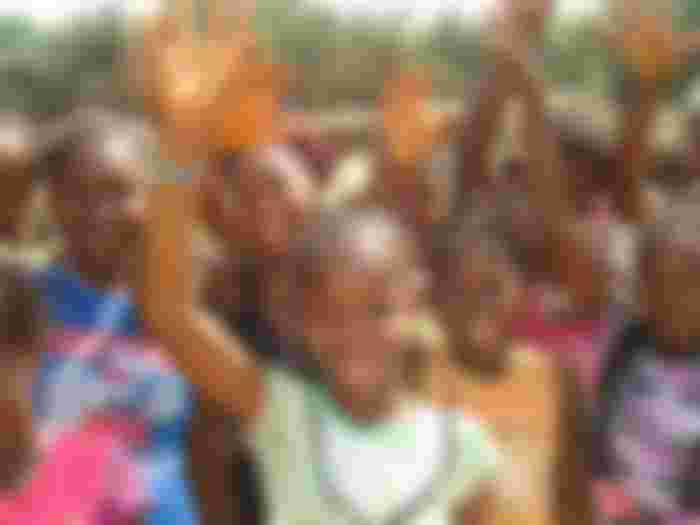Convention on the Rights of the Child
Adopted and opened for signature, ratification and accession by General Assembly resolution 44/25 of 20 November 1989 entry into force 2 September 1990, in accordance with article 49

Convention on the Rights of the Child: The children's version
1. Definition of a child
A child is any person under the age of 18.
2. No discrimination
All children have all these rights, no matter who they are, where they live, what language they speak, what their religion is, what they think, what they look like, if they are a boy or girl, if they have a disability, if they are rich or poor, and no matter who their parents or families are or what their parents or families believe or do. No child should be treated unfairly for any reason.

3. Best interests of the child
When adults make decisions, they should think about how their decisions will affect children. All adults should do what is best for children. Governments should make sure children are protected and looked after by their parents, or by other people when this is needed. Governments should make sure that people and places responsible for looking after children are doing a good job.
4. Making rights real
Governments must do all they can to make sure that every child in their countries can enjoy all the rights in this Convention.

5. Family guidance as children develop
Governments should let families and communities guide their children so that, as they grow up, they learn to use their rights in the best way. The more children grow, the less guidance they will need.
6. Life survival and development
Every child has the right to be alive. Governments must make sure that children survive and develop in the best possible way.

7. Name and nationality
Children must be registered when they are born and given a name which is officially recognized by the government. Children must have a nationality (belong to a country). Whenever possible, children should know their parents and be looked after by them.
8. Identity
Children have the right to their own identity – an official record of who they are which includes their name, nationality and family relations. No one should take this away from them, but if this happens, governments must help children to quickly get their identity back.

9. Keeping families together
Children should not be separated from their parents unless they are not being properly looked after – for example, if a parent hurts or does not take care of a child. Children whose parents don’t live together should stay in contact with both parents unless this might harm the child.
10. Contact with parents across countries
If a child lives in a different country than their parents, governments must let the child and parents travel so that they can stay in contact and be together.
11. Protection from kidnapping
Governments must stop children being taken out of the country when this is against the law – for example, being kidnapped by someone or held abroad by a parent when the other parent does not agree.
12. Respect for children's views
Children have the right to give their opinions freely on issues that affect them. Adults should listen and take children seriously.
13. Sharing thoughts freely
Children have the right to share freely with others what they learn, think and feel, by talking, drawing, writing or in any other way unless it harms other people.
A new study uses United Nations data to measure how children’s rights are respected across the globe.
Iceland, Switzerland and Finland come top.
But worldwide, millions of children face extreme poverty due to COVID-19.
Of the myriad tragic effects of COVID-19, its impact on young people could prove to be one of its most damaging legacies.
The authors of a new report say the crisis has “turned back the clock” on years of progress made on kids’ well-being and put children’s rights under serious pressure across the globe.

The KidsRights Index 2020 measures how children’s rights are respected worldwide, and the extent to which countries are committed to improving them.
The data doesn’t directly include the impact of the pandemic, but the wider report, presented in the context of coronavirus, warns of the “disastrous” impact of the crisis on children.
The index finds the five best places to grow up healthy, well-educated and respected are all developed Western economies. But it does throw up some more surprising results too.
The five lowest-scoring countries are the Central African Republic, Equatorial Guinea, Sierra Leone, Afghanistan and Chad.

Children in South Asia
While South Asia has seen improvements in the socioeconomic situation of children, there is more to be done.
Countries in South Asia have made remarkable progress in human development. Most are now classified middle-income countries, with rapid economic growth and improving social indicators. In the last five years alone over 150 million people have climbed out of income poverty3.
South Asia’s rich ecological, geographic and cultural diversity make the region unique but also explains why it is volatile and vulnerable in social, economic and environmental terms. Bangladesh, India, and Pakistan are among the ten most populous countries in the world while Bhutan and Maldives are among those with the smallest population. Urbanization is also shaping South Asia’s development trajectory. Nearly 130 million South Asians currently live in informal urban settlements4, but with rapid and uncontrolled urbanization this may increase to 42 percent by 20355. The region faces continuing challenges from weak urban governance, poor provision of public services, lack of effective social protection systems and mounting urban poverty to the impact of climate change, natural hazards, political turmoil, gender inequality, etc.

Thailand and Tunisia in top 20
But developed nations don’t exclusively perform better, according to KidsRights. This is because, rather than simply ranking the places where children have the best life, the index scores countries relative to their capacity to implement children’s rights.
So a host of industrialized nations, like the UK (169th), New Zealand (168th) and Australia (135th), sit quite far down the list, while some less developed countries including Thailand (8th) and Tunisia (17th) perform relatively well.
Looking at individual categories provides an interesting picture too. For example, in the life grouping – which considers criteria such mortality rate and life expectancy at birth – the top three consists of Japan, Italy and Singapore. In health, Portugal, Israel and South Korea top the table. And Thailand, Iceland and Tunisia are the top three for enabling child rights.










Decata se naseto bogatstvo . Od nivnoto raganje treba da gi uzivaat site prava koi mu ovozmozuvaat pravilen razvoj, identitet, semejstvo, ljubov, obrazovanie. no, kako sto gledame pokraj zemjite so visok indeks, za zal postojat i zemji so mnogu nizok indeks. strasno e toa kolku mnogu gladni deca ima na zemjinata topka.